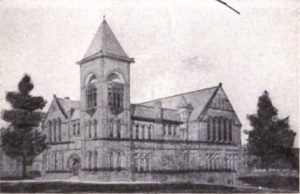Reading Lyman H. Johnson’s lectures on “the Church of the Bible and its Apostasy” from the early 1900s might, at first glance, seem a world away from the sun-drenched beaches and radical transformations of the Jesus Movement in the late 1960s and 70s. His era, his language, his platform in a courthouse in West Virginia – it all feels historically distinct from the surge of spiritual awakening that swept through hippies, yippies, druggies, and “square church kids” decades later.

Yet, beneath the surface of historical context, Johnson’s core message resonates with the very heart of what the Jesus Revolution was all about: God’s true, spiritual work versus the empty forms and man-made structures of religion.
Johnson’s central thesis, that there is a fundamental distinction between “the Church of the Bible and its apostasy” – meaning God’s genuine spiritual church and the man-made religious organizations claiming its name – speaks directly to the desperate search for authenticity that characterized the seekers of the Jesus Revolution. He argues that God’s church is “not a human institution… not a society organized by man. It is a religious body which is God’s own creation,” organized by the Holy Spirit. This mirrors our understanding that the Jesus Movement was a “movement of the Holy Spirit”, where God Himself was transforming lives.
Johnson insists that this true church is made up of those “who have the Word of God and are purified by it” and “who possess true faith”. The radical personal transformations described in the Jesus Revolution, where lives were “radically transform[ed]… from the inside out”, and people came to “know Jesus and became alive in Him”, would be seen by Johnson as clear evidence of this spiritual birth and purification by the Word. His emphasis on the “fruits of the Spirit” as the “dividing line” separating God’s people from the world aligns with the “faith, fervor, and fruit” observed in the new believers of the Jesus Revolution.
However, Johnson’s most striking contribution – and perhaps the most challenging for religious structures of any era – is his uncompromising critique of “man’s church organizations.” He saw these denominations and systems as “moneyed corporations, falsely called churches!”, part of the “Great Apostasy and Harlot Babylon”, characterized by human authority, carnal ordinances, and a lack of spiritual liberty.
He believed these organizations “cut off liberty” and obstructed the free work of God’s Spirit and Word, becoming “broken cisterns of idolatry”. His assertion that “other foundation can no man lay than that is laid which is Jesus Christ”, and that relying on anything else – forms, ceremonies, or human organizations – is “hypocrisy”, powerfully echoes the Jesus Revolution’s rejection of “cultural churchianity that has little to do with the electrifying gospel of Jesus Christ”.
Johnson’s fierce condemnation of religious leaders who prioritized building their own “selfish interests” and systems over preaching Christ alone resonates with the Jesus Revolution’s experience of churches that “missed both the boat and the blessing” by not welcoming the messy, unconventional work of God among the hippies. He would see the rise of “mega-churches” born from the movement with cautious scrutiny, always asking if they remained spiritual assemblies built on Christ and His Word alone, or if they fell into the traps of money power and human control he so vehemently opposed.
Ultimately, Johnson’s lectures are a passionate, deeply rooted call to recognize Christ as the “only head of his church on earth” and to separate from anything that usurps His authority or substitutes human forms for His spiritual reality. He urges his hearers and readers to rely solely on God and “the word of his grace which is able to build you up”. This mirrors the Jesus Revolution’s discovery that the gospel satisfied their “desperate search” and transformed them “from the inside out”.
While Johnson’s battle was fought in court houses and pamphlets against the established denominations of his day, and the Jesus Revolution’s awakening swept through a counter-culture movement years later, both point to an enduring truth: God’s genuine work is spiritual, transforms hearts, relies on His Word, and exists independently of, and often in tension with, the religious systems built and controlled by man. These lectures offer a historical perspective on this vital distinction, helping us understand that the hunger for authentic faith and the critique of religious pretense are not new phenomena, but are part of the ongoing story of God’s Spirit moving among His people, calling them “Come out of her, my people” to follow Christ alone.
- “A Series of Lectures on the Church of the Bible and its Apostasy” by Lyman H. Johnson | Google Books
- If you don’t have the time to download and read the book, here is a short audio overview from NotebookLM.
- A form of godliness (show of religion, piety, holiness, outward righteousness)
- Gnosticism worships special knowledge in the church today